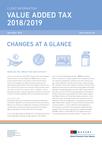
Value Added Tax 2018/2019 - Changes at a glance
Numerous changes may require extensive technical and organisational adjustments. The most notable of these is the Act to Avoid VAT Losses in the Internet Trade of Goods, which will come into force on 1 January 2019. In addition, various transition periods or special regulations will expire at the end of 2018 or will be extended contrary to previous information.
Consignment stock
The Federal Ministry of Finance has once again extended the transitional regulation on turnover taxation in the case of direct delivery via a domestic consignment warehouse. Entrepreneurs can therefore continue to proceed according to the previous legal interpretation until the end of 2019 at the latest.
In a circular letter dated October 10, 2017, the Federal Ministry of Finance decided to endorse the legal opinion of the Federal Court of Finance (Bundesgerichtshof – “BFH”) according to which in the case of a supply of goods from a foreign EU country via a German consignment warehouse with short interim storage, a direct delivery to the German customer can be accepted. The conditions are that the customer is certain at the time of the beginning of the transport and that he has legally committed himself to accept the goods in question (BFH ruling of October 20, 2016, ref. V R 31/15). This new legal opinion of the Federal Ministry of Finance is to be applied in all open cases. However, the Federal Ministry of Finance had initially provided for a transitional provision according to which the customer's input tax deduction would not be objected to if, according to the previous legal interpretation, supplies and intra-Community acquisitions carried out before January 1, 2018 were to be regarded as intra-Community transfers and subsequent taxable domestic supplies. This transitional regulation was already extended in the BMF's letter of December 14, 2017 to supplies and intra-Community acquisitions carried out before 01 January 2019.
The transitional regulation will now be extended once again by BMF letter dated October 31, 2018 and applies to supplies and intra-Community acquisitions carried out before January 1, 2020.
VAT grouping / Fiscal unity
Due to the new BFH case law, non-incorporated partnerships can also qualify as controlled companies, i.e. as affiliates in a VAT group. As a result, VAT groups accrue which were originally deliberately avoided by recourse to non-incorporated partnerships. Company groups have the chance to review and, if necessary, to restructure their group organization until December 31, 2018.
As it is not possible to opt out of the VAT group, the principles of the BMF letter on VAT groups published on 25 June 2017 will be applied after 31 December 2018 (BMF letter dated 26 May 2017 - III C 2 - S 7105/15/10002).
Abolition of the special arrangement for intra-Community transfers
Traders who regularly supply goods from another EU Member State to a larger number of business customers in Germany could make use of the simplification rule under section 1a.2 (14) of the administrative guidelines to the German VAT Code(“UStAE”). As a result, they were permitted to declare an intra-Community acquisition and a subsequent local supply in Germany (instead of a direct intra-Community supply in the EU Member State of dispatch), provided that the tax office in the EU Member State of dispatch agrees. The Federal Ministry of Finance has abolished this simplification (BMF letter of 23 April 2018, BStBl 2018 I p. 638). However, the use of the special regulation will not be objected until 31 December 2018. A
Amendment to Art. 24b of the VAT Directive
For traders providing electronic services (“RFTE” services) to private individuals, there is a facilitation in proving the place of residence of the recipient of the service. Up to an amount of EUR 100,000 (net turnover with corresponding services in all other Member States), evidence in terms of Art 24f of the VAT Directive (e.g. IP address or IBAN country code) will be sufficient as from 2019.
As of 01.01.2019 - Annual Tax Act 2018
As part of the adoption of the "Annual Tax Act 2018" by the Federal Council on 23 November 2018, the following areas of VAT will change:
Voucher Directive
Member States are obliged to transpose the new Articles 30a, 30b and 73A of the VAT Directive into national law by 31 December 2018. The German legislator has adopted most of these provisions.
In the future, a voucher will be defined as an instrument to be regarded as consideration (payment or partial payment) for supplies or services in accordance with Art. 30a No. 1 of the VAT Directive. In addition, the voucher or the related documents shall bear the following information:
- the goods to be supplied, or
- the services to be provided, or
- the identity of the possible suppliers, or
- the service providers
The EU directive distinguishes between so-called single-purpose and multi-purpose vouchers. In the case of single-purpose vouchers, all the information required to determine with certainty the VAT treatment of the underlying transactions (place of supply, VAT rate) is already available when the voucher is issued. The tax point is at the time the voucher is issued or transferred. The actual execution of the service is not subject to taxation.
In contrast to the previous German practice of taxing the single-purpose voucher as a down payment, the new EU legislation regards the issue of such a voucher as a supply in terms of VAT.
In the case of multi-purpose vouchers, only the actual supply of goods or services is subject to VAT. The issue of multi-purpose vouchers is merely an exchange of money for another type of means of payment and is not yet subject to taxation.
Note
In case of the brokerage of single-purpose vouchers in the name and for the account of another person, it is not the broker, but the person in whose name the voucher is sold who owes the VAT for the supply specified in the voucher. It will therefore be important in practice for the company selling the voucher to clarify whether it is acting in its own name or in the name of a third party.
Adjustment Definition of Taxable Amount
The concept of remuneration in sec. 10 (1) sentence 2 German VAT Act (“UStG”) is adapted to the definition in Art. 73 of the VAT Directive. Up to now, sec. 10 (1) sentence 2 UStG refers to what the recipient has spent in order to receive the supply. In accordance with Art. 73 of the VAT Directive, now, the decisive factor is what the service provider ultimately received.
Services supplied electronically
a) Registration Threshold
Since January 1, 2015 the place of supply for services rendered electronically to non-taxable persons according to sec. 3a (5) UStG have to be taxed at the place where the recipient is resident. The so-called reverse charge procedure does not apply to the provision of electronic services to non-entrepreneurs in other EU member states, so the entrepreneur must declare and pay VAT in the country of destination.
As of January 1, 2019, the place of supply for services in terms of of sec. 3a (5) UStG is where the customer is domiciled if they exceed the threshold of EUR 10,000 (net) in the previous or current calendar year. Only as soon as the threshold is exceeded the rule according to sec. 3a (5) UStG is applicable.
Note
The entrepreneur can waive the threshold regulation, whereby the rule according to sec. 3a (5) applies independently of the threshold. The entrepreneur is bound to the waiver for two years.
b) Invoicing formalities
For German entrepreneurs who provide electronic services to private individuals in other EU states, there is a simplification of the billing formalities. Entrepreneurs who participate in the Mini-One-Stop-Shop (“MOSS”) procedure (sec. 18h UStG) can issue invoices in accordance with German regulations pursuant to sec. 14 UStG from 01. January 2019 and do not have to observe the law of the other member states with regard to invoicing as before. The amendment to the VAT Directive will probably be implemented in the last sentence of sec. 14 (7) UStG.
Online marketplaces
a) Record-keeping obligations
On 01 August 2018 the cabinet passed the draft of a "Law for the Avoidance of VAT Losses in Trade with Goods on the Internet". This affects "operators of electronic marketplaces". Examples include Amazon, Ebay. However, there are also indirect obligations for sellers trading via the electronic marketplaces.
Sec. 22f (1) sentence 1 UStG-Draft will in future oblige the operators of an electronic marketplace to record information on sales generated by sellers via the marketplace. If the following conditions are fulfilled, the operators are obliged to keep records:
- The seller is an entrepreneur and
- supplies goods.
- Furthermore, the supply must have been "concluded in terms of civil law" on the electronic marketplace, and
- the transport or dispatch of the supplied goods begins or ends in Germany.
In addition, operators must require from their vendors to provide evidence that they are registered in Germany for VAT purposes. There will be a new form, a registration confirmation, which will be issued by the tax authorities. This must be applied for by the vendor. It is still unclear whether it is sufficient for the operator to have a copy of this confirmation. Vendors who are active on several platforms should therefore request several confirmations at the same time. Sellers from a third country will not receive the certificate unless a receiving agent in Germany has been appointed beforehand.
b) Liability regulations
The second innovation from the "Act for the Avoidance of VAT Losses in Trade with Goods on the Internet" concerns the liability of operators of electronic marketplaces for unpaid taxes of vendors on their platform. Operators are liable for any unpaid taxes arising from a supply by an operator, which must have been concluded in terms of civil law via the operator's marketplace.
"Concluded in terms of civil law" can be defined in relation to Article 7(2d) of the Council Implementation Regulation (“MwStVO”) in the way that a sales contract must have been concluded by means of an automated ordering process carried out by the electronic marketplace. Unpaid tax means VAT due for supplies of goods carried out in Germany.
It is possible for the operators to exclude the above-mentioned liability if they have the registration confirmations of the vendor. If the vendor uses the platform as a non-entrepreneur, the operator is not liable if he has fulfilled his recording obligations with regard to the turnovers generated by the vendor via the platform.
However, there is a counter-exemption, which again leads to the liability of the operators, if the operator knew that the seller had not fulfilled his tax obligations. It is sufficient for this liability that the operator should have been aware of this after exercising the diligence of a prudent businessman.
In the case of vendors who act as non-entrepreneurs, the operator is always liable if the operator was aware or should have been aware, after due care by a prudent businessman, that the turnover was generated within the framework of an enterprise.
Should a vendor not comply with his tax obligations, the tax office is allowed to inform the operator of the electronic marketplace about this fact. The tax office will set the operator a deadline by which the seller must be excluded from the marketplace. If the operator omits this, he is responsible, starting from the time of the note of the tax office, for the VAT due by the vendor, even if he followed his duties of taking care of the confirmation of registration or the recording.




